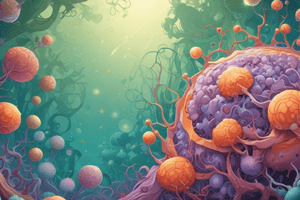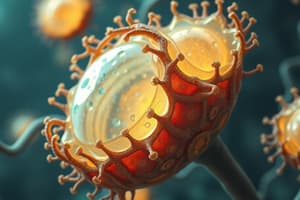Podcast
Questions and Answers
What is primarily responsible for regulating cell expansion in plants?
What is primarily responsible for regulating cell expansion in plants?
- Hormones and genetic factors
- Cell wall loosening and tightening mechanisms (correct)
- Temperature and light
- Generation of membrane lipids and proteins
Which of the following is NOT mentioned as an internal factor influencing growth?
Which of the following is NOT mentioned as an internal factor influencing growth?
- Nutrient availability
- Genetic factors
- Hormones
- Light (correct)
In animals, which gland produces growth hormones that stimulate bone and tissue growth?
In animals, which gland produces growth hormones that stimulate bone and tissue growth?
- Thyroid gland
- Pancreas
- Pituitary gland (correct)
- Adrenal gland
What molecule serves as the energy currency of life?
What molecule serves as the energy currency of life?
During which life stage do humans experience rapid growth in the first two years of life?
During which life stage do humans experience rapid growth in the first two years of life?
Which process involves the synthesis of molecules from simpler compounds to build and repair body tissues?
Which process involves the synthesis of molecules from simpler compounds to build and repair body tissues?
What is the deficiency that leads to weakened bones and stunted growth, particularly in children?
What is the deficiency that leads to weakened bones and stunted growth, particularly in children?
In the context of nutrition, what can disruptions in homeostasis lead to?
In the context of nutrition, what can disruptions in homeostasis lead to?
Which condition is characterized by extreme fear of weight gain, leading to malnutrition and severe health complications?
Which condition is characterized by extreme fear of weight gain, leading to malnutrition and severe health complications?
What is the primary purpose of metabolism in the human body?
What is the primary purpose of metabolism in the human body?
Flashcards are hidden until you start studying
Study Notes
Life Processes: A Focus on Growth
Life is a dynamic, ever-changing phenomenon, driven by a series of interconnected processes that allow living organisms to maintain, grow, and adapt. Among these vital functions, we'll delve into the subtopic of growth, which is fundamental to the existence of all living beings.
What is Growth?
Growth is the increase in size, complexity, or mass of an organism, leading to the development of new structures or the enhancement of existing ones. Growth can be divided into two categories: cellular growth (increase in cell number) and cell expansion (increase in cell size). Both processes require energy, and they are regulated by various environmental factors and internal signals.
Cellular Growth
Cellular growth occurs when an organism produces more cells than it loses. In multicellular organisms, this process involves cell division, or mitosis, and cytokinesis. Mitosis is the process by which a single cell divides into two identical daughter cells, each containing the same number of chromosomes as the parent cell. Cytokinesis is the physical separation of these daughter cells. In some organisms, such as plants, this process can lead to the development of new organs and tissues.
Cell Expansion
Cell expansion is the increase in size of individual cells without an increase in cell number. This process is driven by the synthesis of new cell wall components in plants, or the expansion of the plasma membrane and endomembrane system in animals. Cell expansion is primarily regulated by cell wall loosening and tightening mechanisms in plants, and the generation of membrane lipids and proteins in animals. In plants, cell expansion is essential for growth and development, as it leads to an increase in cell size, organ size, and overall plant size.
Factors Influencing Growth
Growth is influenced by numerous factors, including environmental factors such as temperature, light, and moisture, and internal factors such as hormones, nutrient availability, and genetic factors. For example, in plants, growth hormones such as auxins, gibberellins, cytokinins, and abscisic acid play important roles in regulating growth and development. In animals, growth hormones are produced by the anterior pituitary and stimulate the growth of bones and other tissues.
Growth Periods
Growth is not constant throughout an organism's life. Different organisms have specific growth periods or stages. For example, in humans, infants experience rapid growth during the first two years of life, followed by a slower but continuous growth until adulthood. In plants, growth occurs primarily during the vegetative and reproductive stages, while growth may be limited or halted during periods of dormancy, such as the winter season.
The Role of Energy in Growth
Energy is essential for growth, as it is required for cellular processes such as cell division, maintenance of cellular structures, and synthesis of new molecules. Energy is obtained by organisms through the consumption of food, which is then converted into adenosine triphosphate (ATP) through cellular respiration or photosynthesis. ATP is the energy currency of life, and it is used to drive growth-related processes.
In summary, growth is a vital life process that is responsible for the increase in size, complexity, or mass of living organisms. It is regulated by a combination of internal and external factors and is essential for the development of new structures, the maintenance of existing ones, and the adaptation of organisms to their environment. By understanding the processes and factors that influence growth, we gain a deeper appreciation for life's complexity and interconnectedness.
Studying That Suits You
Use AI to generate personalized quizzes and flashcards to suit your learning preferences.



